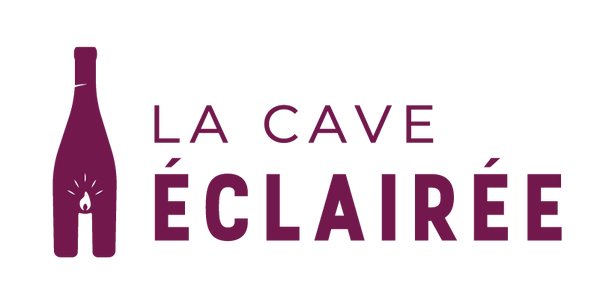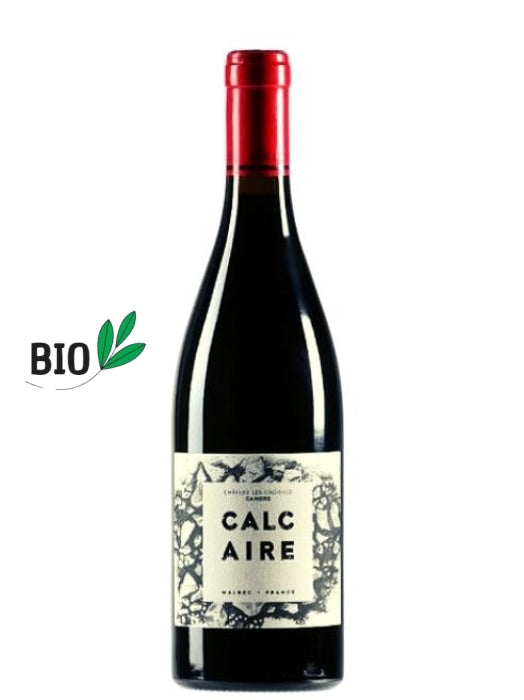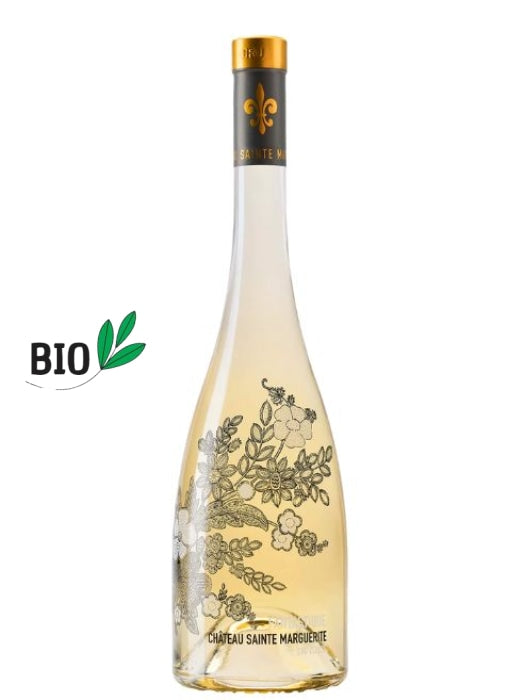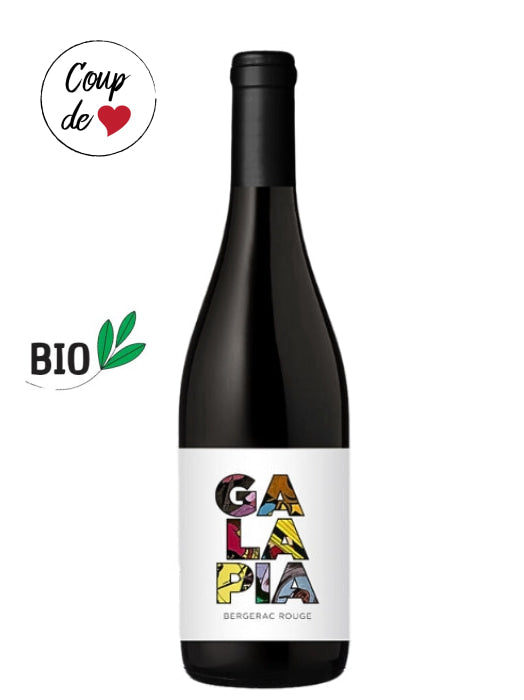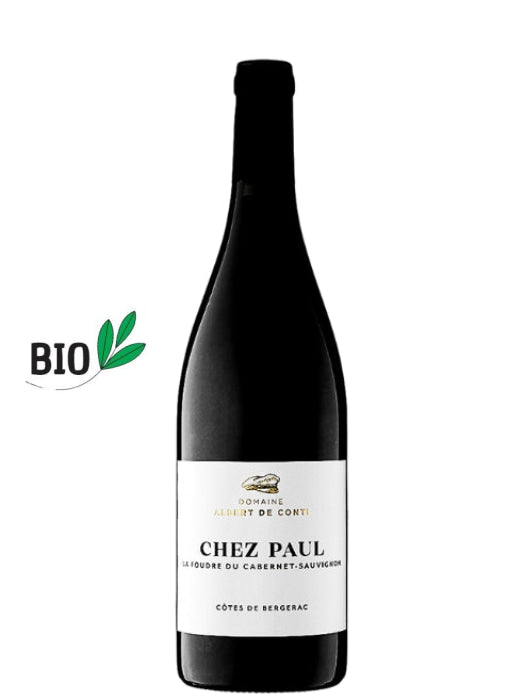Collection: Buy organic wines
Discover here our selection of organic wines and champagnes, combining authenticity and respect for the terroir. Because viticulture is not just about enhancing the richness of the soil, but also about preserving the land and those who cultivate it! From the grand château located within a prestigious AOC to the little-known gem of a small estate, we have chosen a range of bottles here that will captivate you during tasting. Red, white, or rosé, from Burgundy to the Rhône Valley through Champagne and Languedoc, navigate through delicious cuvées selected with love.
-
Château de Beaucastel - Châteauneuf-du-Pape blanc 2023
(2 avis)Usual price 99,00€Usual priceUnit price / par -
Château de Beaucastel - Châteauneuf-du-Pape rouge 2022
Usual price 98,90€Usual priceUnit price / par -
Château de L'Ou - IGP Côtes Catalanes - Infiniment rouge 2020
(2 avis)Usual price 25,50€Usual priceUnit price / par -
Château de L'Ou - IGP Côtes Catalanes - Secret de schistes rouge 2020
(1 avis)Usual price 34,90€Usual priceUnit price / par -
Château de Valois - Pomerol - Magnum
Usual price 63,90€Usual priceUnit price / par -
Château de Valois - Pomerol 2019
(3 avis)Usual price 32,90€Usual priceUnit price / par -
Château Laballe - IGP Côtes de Gascogne - Demoiselle moelleux 2023
(2 avis)Usual price 11,20€Usual priceUnit price / par -
Château Laballe - IGP Landes - Sables fauves blanc 2024
(2 avis)Usual price 9,50€Usual priceUnit price / par -
Château Les Croisille - Cahors - Calcaire
(2 avis)Usual price 15,90€Usual priceUnit price / par -
Château Les Croisille - Cahors - Croizillon 2022
(2 avis)Usual price 10,90€Usual priceUnit price / par -
Château Les Croisille - Cahors - La Pierre 2023
(2 avis)Usual price 23,50€Usual priceUnit price / par -
Château Les Croisille - Cahors - Silice 2022
Usual price 15,50€Usual priceUnit price / par -
Château Leydet-Valentin - Saint-Emilion Grand Cru 2020
(3 avis)Usual price 24,90€Usual priceUnit price / par -
Château Leydet-Valentin - Saint-Emilion Grand Cru 2020 - Magnum
Usual price 49,90€Usual priceUnit price / par -
Château Mille Roses - Haut-Médoc 2019
Usual price 21,00€Usual priceUnit price / par -
Château Mille Roses - Haut-Médoc Magnum 2020
Usual price 43,00€Usual priceUnit price / par -
Château Mille Roses - Margaux 2020
(3 avis)Usual price 31,50€Usual priceUnit price / par -
Château Sainte-Marguerite - Côtes-de-Provence - Fantastique blanc 2022
(1 avis)Usual price 37,90€Usual priceUnit price / par -
Château Sainte-Marguerite - Côtes-de-Provence - Fantastique rosé 2022
Usual price 29,50€Usual priceUnit price / par -
Château Sainte-Marguerite - Côtes-de-Provence - Fantastique rouge 2021
(1 avis)Usual price 37,90€Usual priceUnit price / par -
Château Simone - Palette - Rosé 2023
(1 avis)Usual price 46,90€Usual priceUnit price / par -
Château Smith Haut Lafitte - Pessac-Léognan - Les Hauts de Smith Blanc 2022
(2 avis)Usual price 47,90€Usual priceUnit price / par -
Domaine Albert de Conti - Bergerac - Galapia 2024
(2 avis)Usual price 10,90€Usual priceUnit price / par -
Domaine Albert de Conti - Côtes de Bergerac - Chez Paul 2019
Usual price 24,90€Usual priceUnit price / par
Organic wines
In recent years, organic farming has taken a very important place in France, particularly in the field of wine. Thus, more than 20% of the French vineyard is now managed organically, and this mode of production is experiencing significant growth each year. Today, you can find red, white, and rosé wines from the organic sector in all wine regions of France, from Bordeaux to the Loire, through Languedoc-Roussillon and Champagne.
But what exactly is an organic wine and what criteria must be met to obtain this certification ? Here is a summary of the key elements to remember.
A precise specification
Firstly, an organic wine must comply with a very strict specification. Before 2012, the organic certification and its "AB" label only concerned the grapes and the vine.Since then, European legislation (Euroleaf logo) has also included winemaking to cover the entire wine production process.
Thus, for a wine to be organic, its grapes must be grown without any chemical substances (pesticides, herbicides, or synthetic fertilizers). However, natural inputs like copper or sulfur can be used to combat certain diseases, particularly those caused by humidity (powdery mildew and downy mildew).
Furthermore, all chemical inputs are prohibited during winemaking and only those certified as organic may be authorized. The doses of added sulfites are also limited: 150 mg/L for whites and 100 mg/L for reds.Some winemakers, particularly those engaged in biodynamics under the Demeter label, further reduce these doses to offer bottles known as "natural", free from added sulfites.
Finally, it should be noted that in order to be officially certified organic, a vineyard must undergo a three-year transition period (three vintages) during which it will be managed according to the organic farming specifications. The goal is for the soil and the vine to eliminate certain chemical additives that may have been used previously.
Organic, biodynamic, natural
Choosing an organic wine means making the choice of a wine that respects the environment and your health.By limiting inputs and chemical substances, these cuvées often offer a purer expression of the terroir.
Organic, biodynamic, and natural wines share an environmentally friendly approach but have some essential differences. Here is a summary in a few lines of the important points to remember.
➡ Organic wines : Made from grapes grown without synthetic pesticides or fertilizers, with winemaking regulated by the AB (Organic Agriculture) label.
➡ Biodynamic wines : Based on the principles of biodynamics, they go further by taking into account lunar cycles and using natural preparations to energize the vine. Certifications here are Demeter or Biodyvin.
➡ Natural wines : They are based on organic or biodynamic agriculture, but their particularity lies in the total absence of additives in the cellar (except for little or no added sulfites) as well as winemaking without chemical interventions.
A cellar, a château, or even an estate engaged in one of these approaches seeks above all to produce quality wines, respecting nature and craftsmanship. France is also today a leaderin organic viticulture, with regions like Bordeaux, Burgundy, Champagne, and the Loire having more and more certified winemakers.
Organic for all tastes and budgets
Whether you are a fan of red, white, or rosé wine, you will find organic bottles suited to your preferences here. The most prestigious AOC and AOP now offer certified organic vintages: from powerful reds of Bordeaux to fresh and aromatic whites of the Loire Valley, including rosés from Provence and organic sparkling wines in Champagne.
Our organic wines also cover all price ranges, from the accessible (but well-made) everyday bottle to the Grand Crus of Bordeaux or Burgundy. You will also find within our selection some natural wines or certain vintages without added sulfites, always selected with great care.
At La Cave Éclairée, we love clean and crisp wines, therefore we are very vigilant about any type of deviation : hay and stable aromas, not for us !
The most organic regions of France
Although organic production is possible in all wine regions of France, some areas are more suited to organic farming, notably due to their climate. Indeed, vineyards located in sunny and dry regions, such as Languedoc-Roussillon or Corsica, are particularly favorable for growing vines without chemical inputs. These terroirs allow for excellent red, white, and rosé wines with minimal treatments, thus preserving the purity of the grape and the expression of the terroir.
In the Languedoc-Roussillon, for example, there is a great diversity of organic wines, ranging from powerful reds to aromatic whites and fresh, elegant rosés. Many committed estates thus produce organic cuvées from typical grape varieties such as Muscat, Grenache noir, or Syrah. These cuvées, sometimes aged without added sulfites, offer great complexity and allow for wine production while preserving the surrounding nature.
Conversely, in more humid regions like Champagne, Burgundy, or even certain areas of Bordeaux, organic farming is more complex. Humidity indeed promotes the development of diseases such as downy mildew and powdery mildew, forcing winemakers to use treatments, even in organic farming (copper and sulfites). Nevertheless, many renowned châteaux and estates are firmly rooted in the production of organic wines.
Thus, depending on the region and climatic conditions, the commitment to organic wine requires true adaptation.
AOC and AOP in organic
In France, organic farming and AOC/AOP share the same ambition : to preserve the quality and authenticity of wines from our terroirs.
Thus, as you will have understood, organic farming prohibits the use of synthetic pesticides and chemical fertilizers, thereby promoting living soils and rich biodiversity.On its part, a Controlled Designation of Origin (AOC) –or its European equivalent, the Protected Designation of Origin (AOP)– guarantees the geographical origin of a wine and adherence to a strict specification related to grape varieties, cultivation, and winemaking methods.
Moreover, while an organic wine can and often does come from an AOC/AOP, the reverse is not automatic: a designation does not necessarily mean organic cultivation.
Several AOCs in France are particularly advanced on these environmental issues. In this regard, the AOC Corbières in Languedoc, the AOP Châteauneuf-du-Pape in the Rhône Valley, and also the AOC Alsace are excellent examples, with many estates cultivating their vines organically.
Finally, some designations, such as the AOC Patrimonio in Corsica, even include agro-environmental provisions aimed at encouraging more environmentally friendly practices ! Perhaps in the future, some designations will include a requirement to be at least organic in their specifications ?
Choose the organic wine that matches your tastes
Choosing an organic wine can seem a bit confusing for the novice. However, with a few tips, you will quickly find the bottle that suits you.
First of all, it is necessary to define your taste preferences. Organic wines are indeed available in a wide variety, whether full-bodied reds or fruity whites.Think about what you prefer to drink: a full-bodied red wine or a lighter white wine? A mineral white wine or bubbles for the aperitif ?
If you are looking for a specific origin, opt for an organic wine from the region or the AOP of your choice. This will ensure that your bottle of wine is produced in a specific geographical area adhering to strict standards, both in terms of viticulture and production.
Finally, the best advice is to taste ! Don't be afraid to explore new flavors. A quality organic wine often stands out for its purity and authentic aromas. Take the time to discover different types of organic wines to identify the one that appeals to you the most.
Do you want to explore the world of organic wine in more depth? La Cave Éclairée offers you a home tasting workshop, to introduce you to different types of organic or natural wines. This workshop will allow you, for example, to better understand the characteristics of these wines, the grape varieties used, and the best ways to taste them.
The best organic wines delivered
Now, all you have to do is make your choice from our wide selection of organic wines! Remember that we offer free on-site pickup at our warehouse as well as delivery to a relay point or home to make things easier for you !
Ready to treat yourself ? If you need advice, do not hesitate to contact us directly La Cave Éclairée!
-

Conventional, organic, biodynamic, natural wine...
Here is a question that comes up (very) regularly! It must be said that the proliferation of labels does not really help the consumer to find their way... AB, HVE,...
1 commentConventional, organic, biodynamic, natural wine...
Here is a question that comes up (very) regularly! It must be said that the proliferation of labels does not really help the consumer to find their way... AB, HVE,...
1 comment
-
✔️ 100% OF THE WINES TASTED
-
📦 FAST AND SECURE SHIPMENTS
-
🍷 IDEAL CONSERVATION
-
💳 100% SECURE PAYMENTS
